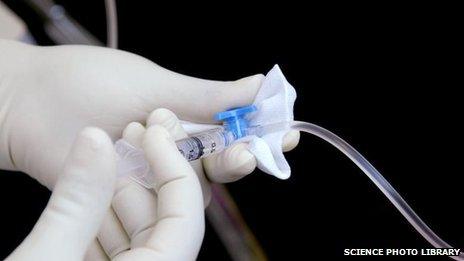Doctors write letter in support of assisted suicide bill
- Published

The letter said the change in the law would add to the level of palliative care available in Scotland
A group of doctors including a surgeon and a professor of neurology have spoken out in support a bill legalising assisted suicide.
The 11 medical experts are backing a bill proposed by MSP Margo MacDonald which would change the law in Scotland.
In a letter to The Herald newspaper, the doctors state that they believe the bill will add to the palliative care on offer in Scotland, not undermine it.
A previous attempt to pass the bill was voted down by MSPs in 2010.
'Sufficient safeguards'
One of the letter's signatories, surgeon Gillian MacDougall said more GPs support the proposed legislation but fear being labelled "Dr Death".
The group also stated that they believed that the proposals had sufficient levels of safeguards in place to prevent a doctor feeling coerced into participating in the process without being fully convinced of a case's merits.
The group's letter stated: "We believe the safeguards designed to protect the vulnerable are comprehensive and rigorous, with doctors being the best professionals to assess for any concerns regarding coercion.
"We are also reassured a doctor cannot be compelled to participate in the process, should they not wish to do so.
"As doctors, we support the Assisted Suicide (Scotland) Bill."
The Bill is the second attempt to change the law by independent Ms MacDonald, who has Parkinson's disease.
Lothian MSP Ms MacDonald said she believed it could be successful this time.
She said: "I have sensed from the beginning that there was a change because of the volume of support that we can demonstrate."
'Professional opinions'
Under the proposed legislation, only those who are terminally ill or who are suffering from deteriorating progressive conditions which make life intolerable will be able to seek assisted suicide.
Any requests to GPs must be backed up by a second professional opinion and followed by a 14-day "cooling-off" period.
This process is then repeated again with a second request, after which one of the doctors concerned would supply a licensed facilitator with a prescription to enable assisted suicide to take place.
This facilitator, or "friend at the end", has no relationship with the patient and is given the task of collecting the prescription and agreeing the process of assisted suicide, including whether the person wishes to say goodbye to their family and friends.
If the prescription is not used within 14 days, it must be returned to the chemist.
Another signatory, emeritus professor of medical neurology at Edinburgh University, Charles Warlow, said: "I think it is part of one's doctoring responsibility to help someone at the end of life.
"I know many people do that with the double effect of morphine. It is all secretive and it should not be."
Compassionate care
Care Not Killing, an umbrella organisation co-ordinating opposition to the proposed bill, said a recent survey of members of The Royal College of General Practitioners (RCGP) suggested that the vast majority were against the change in the law.
A spokesman for Care Not Killing said: "The RCGP gave a succinct presentation of their reasons for opposing any change in the law.
"They feel it would be detrimental to the doctor-patient relationship and shift the focus away from investing in palliative care and treatments for terminal illnesses"
He added: "It is reassuring that so many of our doctors and medical professionals want to focus on good, compassionate care and not to open their profession up to the deliberate ending of patients' lives."
- Published14 November 2013
- Published15 May 2013
- Published9 February 2013